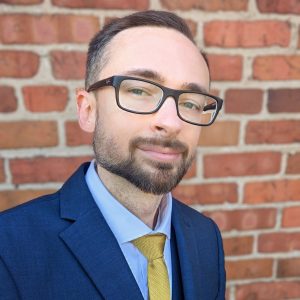
We recently welcomed Zachary Tumlin as a new staff member in the Rubenstein Library’s Technical Services department! We asked Zachary a few questions to help us—and you—get to know him a little better.
Tell us a little bit about your new job at the Rubenstein Library.
I am the Project Archivist for the Economists’ Papers Archive, which is a collaboration between the Center for the History of Political Economy and the David M. Rubenstein Rare Book and Manuscript Library. It contains the papers of over 70 economists (mostly from the 20th century), including several Nobel prize winners. It is also the official repository for the records of the American Economic Association and History of Political Economy (which was founded at Duke in 1969 and is published by Duke University Press).
I am currently processing the papers of Dr. Marc Nerlove, who concentrated on agricultural economics and econometrics. His collection was originally 206 boxes because he was active for 60 years before retiring from the University of Maryland, which is where I earned my graduate degree from. It was not until after I started this job that I learned that he lives in the same neighborhood that I just left, literally only a few minutes’ walk from door to door.
What did your path to becoming an archivist look like?
I am originally from West Virginia and earned my Bachelor of Music in Music Education from West Virginia University (WVU). I was a middle school band director in the state for three years but had a poor experience, and that combined with an autism diagnosis led me to reconsider my career goal to be a high school or college director of bands. I came across librarianship and specifically music librarianship online while exploring my options, and this reminded me of times when I managed sheet music collections for performing ensembles that I was a member or leader of (something I had done since high school).
I have been fortunate to have a large personal library since childhood, and I have always naturally been drawn towards preservation and systemization (I can access born-digital files dating back to elementary school assignments). How autism manifests itself in me combined with my personal characteristics make me well-suited for this field and there are others like me, whether they are out and proud all the way to not even suspecting that they might meet the diagnostic criteria.
Lastly, I have conducted geological research on my family and am a member of the National Society Sons of the American Revolution under two ancestors with others possible. I understand the importance of being able to document and share your story through records.
Tell us about the advocacy work that you do.
My self-advocacy is grounded in the fact that I am an adult diagnosed Autistic, but I also identify as neurodivergent and Disabled because of the need to not silo myself among others who have received the exact same diagnosis. My areas of emphasis include employment, policy and law, history and culture, education, and representation in media.
I specify that I am a formal Disability self-advocate to indicate that I do this both personally and professionally. For example, as a founding Steering Committee member of the Society of American Archivists Accessibility and Disability Section, I have published on inclusive hiring, retention, and advancement, and as a member of the Music Library Association Diversity Committee, I have presented on accommodations for Autistics and training for both allies and other self-advocates.
My initial goal was to connect with anyone and everyone on campus who is doing anything significant related to accessibility and Disability and get involved, so if I have not met you yet, please reach out!
What are you most looking forward to in your new job and in Durham?
First, my most recent job search lasted from January 2019 to December 2022 and totaled 645 applications, 84 screening calls or first round interviews, and six offers, so while my current position is only grant-funded for one year, it is still nice to be able to rest, even if only temporarily.
Second, I eventually narrowed my search to the Washington, DC metropolitan area (where I was still living) and North Carolina (where someone very important to me had relocated to). I needed to secure full-time employment and move closer, so I am incredibly grateful for this opportunity to prove myself and the Triangle feels like the best place for me in NC if I had to leave DC. I am looking forward to seeing Australian, Autistic comedian Hannah Gadsby at the Performing Arts Center in April.
Tell us something unique about yourself.
My primary instrument is trombone and at WVU I studied under professor Dr. H. Keith Jackson (now Dean of the College of Creative Arts). In my first semester, I saw (and recorded) him perform a theatre piece (a piece of music that includes directions more commonly seen in theatre—for staging, costuming, lighting, dialogue, movement, etc.). A couple years later, a doctoral student performed a different one (this one included prerecorded audio). Both instances motivated me to ask Dr. Jackson if I could continue this pattern and we agreed on “General Speech” (watch my performance on my YouTube channel). Afterwards, I gave a companion lecture on theatre pieces to the trombone studio, which is a kind of public speaking/presenting I do much more often now.
Thanks Zachary, and welcome to the Rubenstein Library! We’re glad to have you here.


